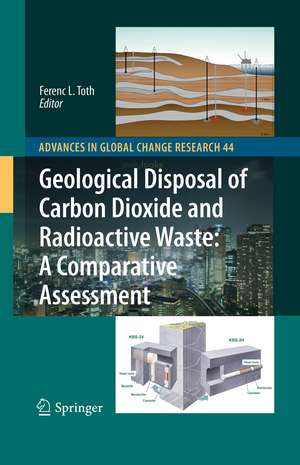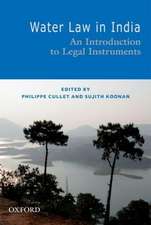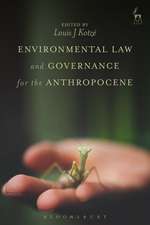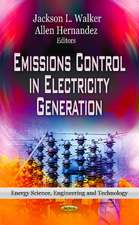Geological Disposal of Carbon Dioxide and Radioactive Waste: A Comparative Assessment: Advances in Global Change Research, cartea 44
Editat de Ferenc L. Tothen Limba Engleză Paperback – 23 noi 2014
Geological disposal has been studied for decades by the nuclear industry with a view to ensuring the safe containment of its wastes. Geological disposal of carbon dioxide and that of radioactive waste gives rise to many common concerns in domains ranging from geology to public acceptance. In this respect, comparative assessments reveal many similarities, ranging from the transformation of the geological environment and safety and monitoring concerns to regulatory, liability and public acceptance issues. However, there are profound differences on a broad range of issues as well, such as the quantities and hazardous features of the materials to be disposed of, the characteristics of the targeted geological media, the site engineering technologies involved and the timescales required for safe containment at the disposal location.
There are ample opportunities to learn from comparisons and to derive insights that will assist policymakers responsible for national energy strategies and international climate policies.
| Toate formatele și edițiile | Preț | Express |
|---|---|---|
| Paperback (1) | 1233.69 lei 43-57 zile | |
| SPRINGER NETHERLANDS – 23 noi 2014 | 1233.69 lei 43-57 zile | |
| Hardback (1) | 1239.19 lei 43-57 zile | |
| SPRINGER NETHERLANDS – 27 feb 2011 | 1239.19 lei 43-57 zile |
Din seria Advances in Global Change Research
- 15%
 Preț: 636.12 lei
Preț: 636.12 lei -
 Preț: 439.83 lei
Preț: 439.83 lei - 18%
 Preț: 895.45 lei
Preț: 895.45 lei - 15%
 Preț: 648.24 lei
Preț: 648.24 lei - 18%
 Preț: 1036.54 lei
Preț: 1036.54 lei - 18%
 Preț: 894.16 lei
Preț: 894.16 lei - 18%
 Preț: 963.60 lei
Preț: 963.60 lei - 18%
 Preț: 1239.49 lei
Preț: 1239.49 lei - 15%
 Preț: 649.71 lei
Preț: 649.71 lei - 18%
 Preț: 1243.78 lei
Preț: 1243.78 lei - 18%
 Preț: 1114.02 lei
Preț: 1114.02 lei - 15%
 Preț: 648.89 lei
Preț: 648.89 lei - 18%
 Preț: 960.78 lei
Preț: 960.78 lei - 15%
 Preț: 643.99 lei
Preț: 643.99 lei - 18%
 Preț: 1834.44 lei
Preț: 1834.44 lei - 15%
 Preț: 649.06 lei
Preț: 649.06 lei - 18%
 Preț: 955.70 lei
Preț: 955.70 lei - 18%
 Preț: 956.03 lei
Preț: 956.03 lei - 18%
 Preț: 1232.26 lei
Preț: 1232.26 lei - 18%
 Preț: 955.88 lei
Preț: 955.88 lei - 18%
 Preț: 959.19 lei
Preț: 959.19 lei - 18%
 Preț: 944.82 lei
Preț: 944.82 lei - 18%
 Preț: 1105.19 lei
Preț: 1105.19 lei - 15%
 Preț: 644.49 lei
Preț: 644.49 lei - 15%
 Preț: 643.99 lei
Preț: 643.99 lei - 18%
 Preț: 1841.54 lei
Preț: 1841.54 lei - 18%
 Preț: 1225.94 lei
Preț: 1225.94 lei - 18%
 Preț: 954.62 lei
Preț: 954.62 lei - 5%
 Preț: 1414.80 lei
Preț: 1414.80 lei
Preț: 1233.69 lei
Preț vechi: 1504.49 lei
-18% Nou
Puncte Express: 1851
Preț estimativ în valută:
236.07€ • 247.10$ • 196.48£
236.07€ • 247.10$ • 196.48£
Carte tipărită la comandă
Livrare economică 31 martie-14 aprilie
Preluare comenzi: 021 569.72.76
Specificații
ISBN-13: 9789400735439
ISBN-10: 940073543X
Pagini: 656
Ilustrații: XVI, 621 p.
Dimensiuni: 155 x 235 x 34 mm
Greutate: 0.9 kg
Ediția:2011
Editura: SPRINGER NETHERLANDS
Colecția Springer
Seria Advances in Global Change Research
Locul publicării:Dordrecht, Netherlands
ISBN-10: 940073543X
Pagini: 656
Ilustrații: XVI, 621 p.
Dimensiuni: 155 x 235 x 34 mm
Greutate: 0.9 kg
Ediția:2011
Editura: SPRINGER NETHERLANDS
Colecția Springer
Seria Advances in Global Change Research
Locul publicării:Dordrecht, Netherlands
Public țintă
ResearchCuprins
Preface H.-H. Rogner
Introductory chapter
Comparing the Geological Disposal of Carbon Dioxide and Radioactive Waste: Introduction and Overview
Section A Thematic Assessments
Geological Media and Factors for the Long-term Emplacement and Isolation of Carbon Dioxide and Radioactive Waste
Environmental Issues in the Geological Disposal of Carbon Dioxide and Radioactive Waste
Risk Assessment, Risk Management and Remediation for the Geological Disposal of Radioactive Waste and Storage of Carbon Dioxide
Monitoring Methods Used to Identify the Migration of Carbon Dioxide and Radionuclides in the Geosphere
Transport of Carbon Dioxide and Radioactive Waste
Engineering Challenges in the Geological Disposal of Radioactive Waste and Carbon Dioxide
The Costs of the Geological Disposal of Carbon Dioxide and Radioactive Waste
Managing Liability: Comparing Radioactive Waste Disposal and Carbon Dioxide Storage
Public Acceptance of Geological Disposal of Carbon Dioxide and Radioactive Waste: Similarities and Differences
Comparative Ethical Issues Entailed in the Geological Disposal of Radioactive Waste and Carbon Dioxide in the Light of Climate Change
Psychological Perspectives on the Geological Disposal of Radioactive Waste and Carbon Dioxide
Section B Regional Assessments
Comparative Assessment of Status and Opportunities for Carbon Dioxide Capture and Storage and RadioactiveWaste Disposal in North America
Comparing the Geological Disposal of Carbon Dioxide and Radioactive Waste in Western Europe
Carbon Dioxide and Radioactive Waste in Central and Eastern Europe: A Regional Overview of Geological Storage and Disposal Potential
Comparison of the Geological Disposal of Carbon Dioxide and Radioactive Waste in European Russia
Comparison between Geological Disposal of Carbon Dioxide and Radioactive Waste in China
Geological Disposal of Carbon Dioxide and Radioactive Waste in the Geotectonically Active Country of Japan
The Geological Storage of Carbon Dioxide and Disposal of Nuclear Waste in South Africa
Assessment of the Geological Disposal of Carbon Dioxide and Radioactive Waste in Brazil, and Some Comparative Aspects of their Disposal in Argentina
Index
Introductory chapter
Comparing the Geological Disposal of Carbon Dioxide and Radioactive Waste: Introduction and Overview
Section A Thematic Assessments
Geological Media and Factors for the Long-term Emplacement and Isolation of Carbon Dioxide and Radioactive Waste
Environmental Issues in the Geological Disposal of Carbon Dioxide and Radioactive Waste
Risk Assessment, Risk Management and Remediation for the Geological Disposal of Radioactive Waste and Storage of Carbon Dioxide
Monitoring Methods Used to Identify the Migration of Carbon Dioxide and Radionuclides in the Geosphere
Transport of Carbon Dioxide and Radioactive Waste
Engineering Challenges in the Geological Disposal of Radioactive Waste and Carbon Dioxide
The Costs of the Geological Disposal of Carbon Dioxide and Radioactive Waste
Managing Liability: Comparing Radioactive Waste Disposal and Carbon Dioxide Storage
Public Acceptance of Geological Disposal of Carbon Dioxide and Radioactive Waste: Similarities and Differences
Comparative Ethical Issues Entailed in the Geological Disposal of Radioactive Waste and Carbon Dioxide in the Light of Climate Change
Psychological Perspectives on the Geological Disposal of Radioactive Waste and Carbon Dioxide
Section B Regional Assessments
Comparative Assessment of Status and Opportunities for Carbon Dioxide Capture and Storage and RadioactiveWaste Disposal in North America
Comparing the Geological Disposal of Carbon Dioxide and Radioactive Waste in Western Europe
Carbon Dioxide and Radioactive Waste in Central and Eastern Europe: A Regional Overview of Geological Storage and Disposal Potential
Comparison of the Geological Disposal of Carbon Dioxide and Radioactive Waste in European Russia
Comparison between Geological Disposal of Carbon Dioxide and Radioactive Waste in China
Geological Disposal of Carbon Dioxide and Radioactive Waste in the Geotectonically Active Country of Japan
The Geological Storage of Carbon Dioxide and Disposal of Nuclear Waste in South Africa
Assessment of the Geological Disposal of Carbon Dioxide and Radioactive Waste in Brazil, and Some Comparative Aspects of their Disposal in Argentina
Index
Textul de pe ultima copertă
Fossil fuels will remain the backbone of the global energy economy for the foreseeable future. The contribution of nuclear energy to the global energy supply is also expected to increase. With the pressing need to mitigate climate change and reduce greenhouse gas emissions, the fossil energy industry is exploring the possibility of carbon dioxide disposal in geological media.
Geological disposal has been studied for decades by the nuclear industry with a view to ensuring the safe containment of its wastes. Geological disposal of carbon dioxide and that of radioactive waste gives rise to many common concerns in domains ranging from geology to public acceptance. In this respect, comparative assessments reveal many similarities, ranging from the transformation of the geological environment and safety and monitoring concerns to regulatory, liability and public acceptance issues. However, there are profound differences on a broad range of issues as well, such as the quantities and hazardous features of the materials to be disposed of, the characteristics of the targeted geological media, the site engineering technologies involved and the timescales required for safe containment at the disposal location.
There are ample opportunities to learn from comparisons and to derive insights that will assist policymakers responsible for national energy strategies and international climate policies.
Geological disposal has been studied for decades by the nuclear industry with a view to ensuring the safe containment of its wastes. Geological disposal of carbon dioxide and that of radioactive waste gives rise to many common concerns in domains ranging from geology to public acceptance. In this respect, comparative assessments reveal many similarities, ranging from the transformation of the geological environment and safety and monitoring concerns to regulatory, liability and public acceptance issues. However, there are profound differences on a broad range of issues as well, such as the quantities and hazardous features of the materials to be disposed of, the characteristics of the targeted geological media, the site engineering technologies involved and the timescales required for safe containment at the disposal location.
There are ample opportunities to learn from comparisons and to derive insights that will assist policymakers responsible for national energy strategies and international climate policies.
Caracteristici
The first ever book presenting in-depth comparative assessments of the geological disposal of CO and radioactive waste Addresses a key issue in the choice faced by policymakers in many countries between fossil fuels with CO2 capture and disposal and nuclear power with radioactive waste disposal Presents a wide range of thematic and regional comparative assessments Presents the state of the art in the two areas and builds the comparative assessment on this solid basis Written by leading experts in the two areas Includes supplementary material: sn.pub/extras














